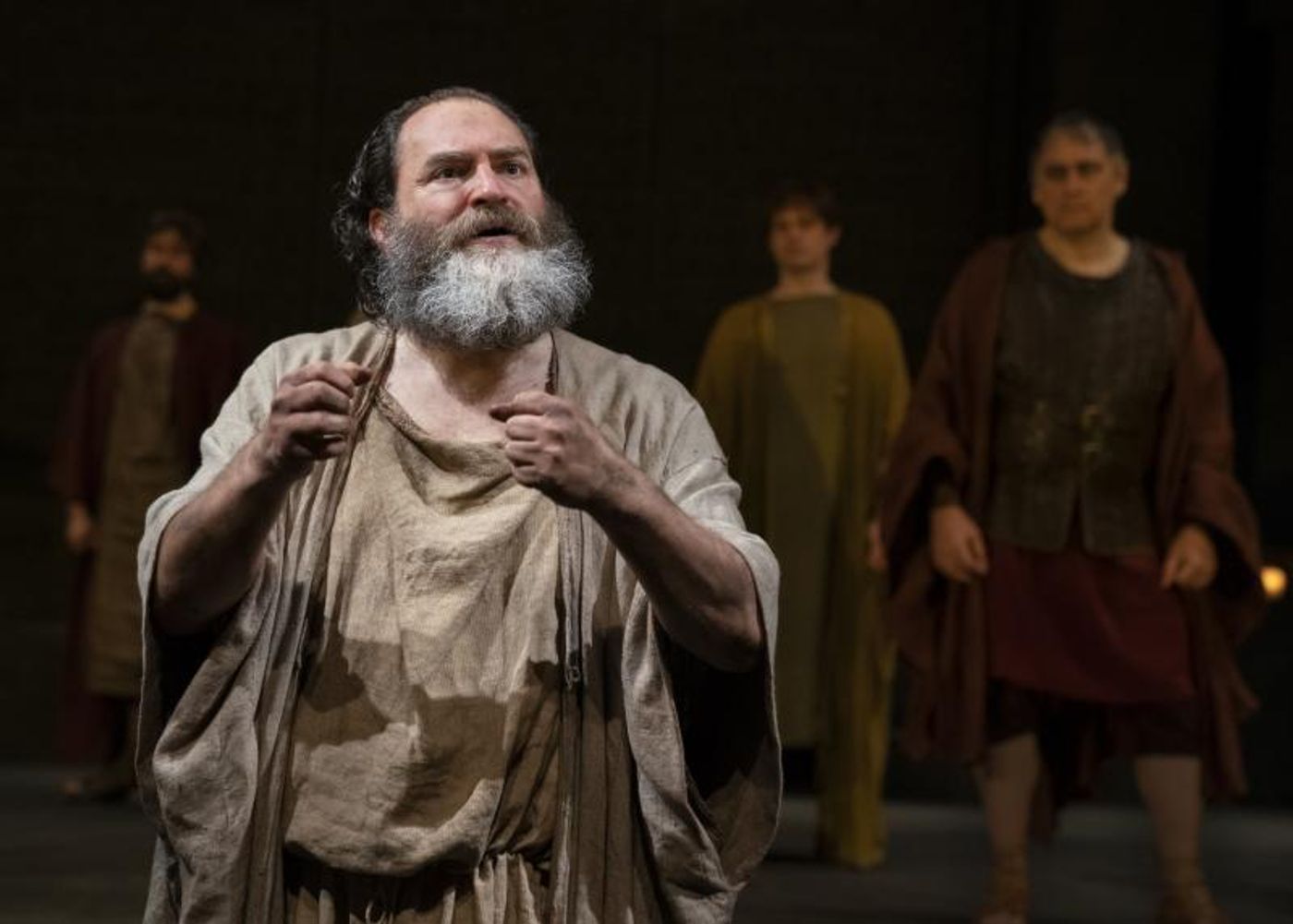Review: Tim Blake Nelson's SOCRATES Honors The Philosopher Condemned For Encouraging Free Thought
"Would you rule justly?" the ancient Greek philosopher who serves as title character of Tim Blake Nelson's drama Socrates asks a fellow citizen who claims he would do a better job than the current political leaders.

"I'd rule to make Athens great," answers the metal-craftsman, whose support of the current war might be influenced by the income he receives molding breastplates and spears for soldiers.
Despite the occasional contemporary-sounding reference that may jar a bit, Nelson's play, though a bit stretched out, is generally a fine character study of one of recorded history's earliest known great thinkers.
Since there are no existing first-hand writings from the subject himself, Nelson has the story told by his former pupil, Plato (Teagle F. Bougere), whose accounts are the primary source for our current knowledge of his teachings. Listening closely is an unnamed boy (Niall Cunningham), a newcomer to Athens, and perhaps the playwright's stand-in for Plato's most famous student, Aristotle.
The lad isn't impressed with his new surroundings, which he describes as "a city that killed its greatest thinker. Killed him like a traitor."
At first Plato isn't interested in addressing the boy's belligerence, but when he frames his accusations "in the context of a democracy where leaders and their actions are promulgated as representing the people's will," the elder philosopher feels compelled to explain how the actions of that noble form of government can sometimes go awry.
Played by with gentle warmth and humor by Michael Stuhlbarg, we first meet Socrates as he's enjoying several servings of wine with his cronies at a gathering hosted by the dignified Crito (Robert Joy). The guests include the playwright Aristophanes (Tom Nelis), and the muscular Alcibiades (Austin Smith), who jokes about how, in his younger days, he would often see their friend "lurking around the gymnasium and baths leering like a pervert fit for exile."
In a lengthy speech, Alcibiades tell how, after spotting Socrates ogling him, he offered his company, hoping to absorb some of the man's famous knowledge, only to find the him more interested in probing conversations than in physical pleasure. He also describes Socrates' heroism on the battlefield when the two served together.
During more sober moments, we're presented with examples, like the one with the aforementioned metal craftsman (Lee Wilkof), of how Socrates, who claimed to know nothing, would encourage thought among his fellow Athenians without instructing them on what to think.
.jpg?format=auto&width=1400)
(Photo: Joan Marcus)
Socrates would reject accolades of being a great teacher, and thus refused payment for simply talking with people, much to the consternation of his wife Xanthippe (Miriam A. Hyman), who struggled to care for their children while her penniless and rarely home husband went about his intellectual business.
Of course, one who encourages free thought might be regarded as dangerous by those in power, so Socrates is put to trial on charges that, "He has worshiped Gods not sanctioned by Athens, he has practiced atheism, and he has corrupted the youth of Athens."
The democratic process finds him guilty by a thin margin and sentenced to death by poisoning. The scene where he takes a final bath and, after drinking from a bowl containing a solution of hemlock, suffers a slow, painful death, is played by Stuhlbarg with quiet, dignified beauty.
Designer Catherine Zuber's period costumes are the most opulent embellishments to director Doug Hughes austere production. Designer Scott Pask's museum-like setting is highlighted by walls that extend out into the audience, inscribed with the words of the funeral oration given for Socrates by Pericles.
Reader Reviews
Powered by
|
Videos

